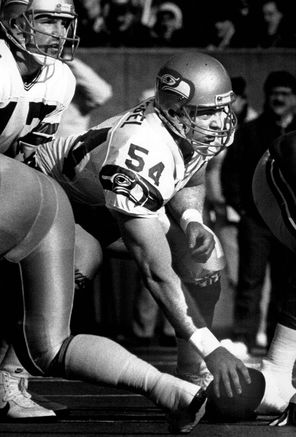There is no disputing what killed Grant Feasel on July 15, 2012. He drank himself to death and died of liver failure at 52. But bubbling below the surface was an undercurrent his family didn’t know about until after his death, something that put Grant’s final years in perspective. Grant suffered from chronic traumatic encephalopathy, the degenerative brain disease better known as CTE. That diagnosis offered an answer to an elusive question for friends and family: What in the world had happened to Grant Feasel?
 It’s unlikely anyone who isn’t a Seattle Seahawks fan would have reason to remember Grant Feasel. A relatively anonymous center and long snapper on a series of bad teams in the late 80s (and the Minnesota Vikings in the early 90s), Feasel wasn’t the kind of player who attracted attention. He was the sort of player doing the dirty work in the trenches, hitting and being hit on every offensive play. I heard an ex-player describe an NFL game as the equivalent of an automobile accident on every play, and Feasel was at the epicenter of that chaos and violence. He “had his bell rung” with regularity, back in the day when no one connoted frequently head trauma with long-term damage and conditions like CTE. At 6’7”, Feasel was the sort of man who looked as if he was born to play football- big, tough, and willing to sacrifice himself for his family and the good of the team. His family had his back. The NFL? Not so much.
It’s unlikely anyone who isn’t a Seattle Seahawks fan would have reason to remember Grant Feasel. A relatively anonymous center and long snapper on a series of bad teams in the late 80s (and the Minnesota Vikings in the early 90s), Feasel wasn’t the kind of player who attracted attention. He was the sort of player doing the dirty work in the trenches, hitting and being hit on every offensive play. I heard an ex-player describe an NFL game as the equivalent of an automobile accident on every play, and Feasel was at the epicenter of that chaos and violence. He “had his bell rung” with regularity, back in the day when no one connoted frequently head trauma with long-term damage and conditions like CTE. At 6’7”, Feasel was the sort of man who looked as if he was born to play football- big, tough, and willing to sacrifice himself for his family and the good of the team. His family had his back. The NFL? Not so much.
Feasel died at 52, a shell of the man who dealt out and absorbed punishment on long-ago Sunday afternoons. As with so many other former players, we’re learning that America’s favorite game can exact a terrible toll on those who play it. After his death, an examination of Feasel’s brain diagnosed CTE between stages two and three of a possible four. The game he played to support his family is what triggered his demise. Yes, he drank himself to death, but would he have traveled that path if not for the frequent traumatic and undiagnosed concussions? Would he have retreated from his family and become a shadow of the man his family knew and loved?
Grant Feasel is not the first such tragic example of the cost of an NFL career. Dave Duerson, Mike Webster, and Junior Seau leap immediately to mind, but there are numerous cases of ex-players consumed and eventually destroyed by repeated brain trauma suffered during their playing careers. Even in the wake of the NFL’s nine-figure settlement with 4,500 ex-players, there are far more questions than answers. How many more Grant Feasels will there be? Will the NFL finally fully take ownership of this tragedy? Can professional football be played in a manner that doesn’t subject many of its former players to a slow, lingering death? In an era when ever larger, stronger, and faster men engage in repeated and astonishing acts of violence, can a player’s long-term health be protected? Or must players accept the reality that whatever wealth and fame they accrue may come at the expense of their quality of life after their playing days are done?
I love football. I played the game growing up, and I spent untold hours as a schoolboy working toward my dream of one day becoming an NFL quarterback. That dream was never realized, and knowing what I know now, I find myself wondering if I should be grateful I fell short.
In the early 20th century, football was actually banned because of the number of people who died while playing the game. Here in the early 21st century, the deaths may be less immediate, but they’re every bit the senseless tragedy they were a century ago. The question now is what the NFL will do…and what society will demand be done.
Grant Feasel’s family deserved to have their husband and father around until he’d lived a long and full life. How long will families of ex-players bury their loved ones well before their time? Is the cost worth the entertainment value provided on Sunday afternoons?
I wish I had answers, but I find myself asking questions with increasing frequency these days…and I’m wondering how long I can continue watching what’s become our national blood sport?
